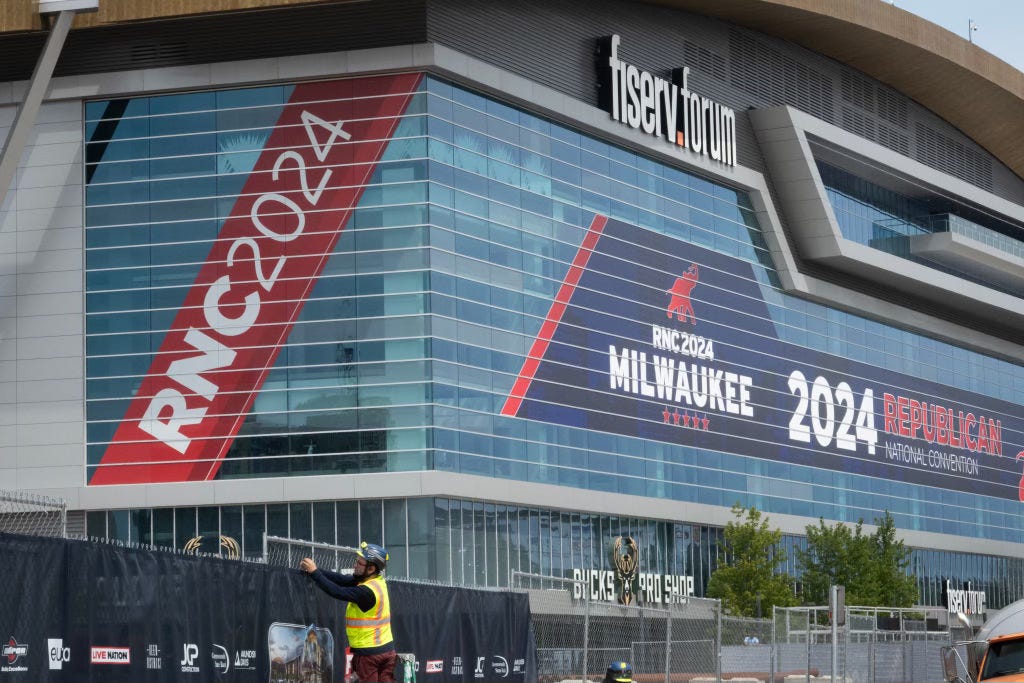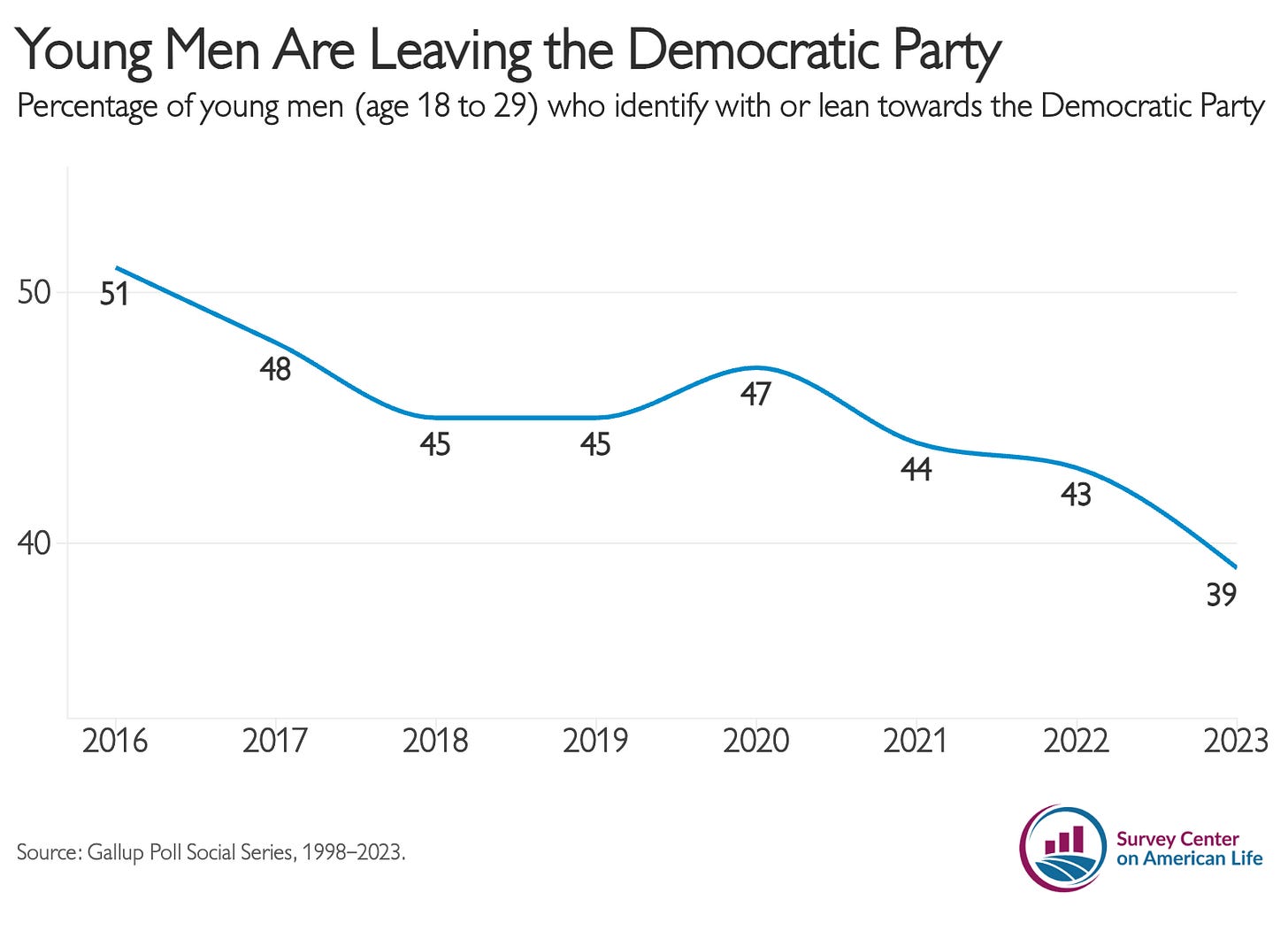The GOP is Poised to Make Gains With Young Voters
As the RNC gets under way, new polling suggests they already have made inroads.
Editor's note: The assassination attempt on the former president at a political rally this past weekend is obviously on everyone's minds. One innocent person is dead, Corey Comperatore who was shielding his family, two are critically injured, and without a fateful turn of his head Donald Trump could also be on this list. Americans deserve a full accounting of the security failures that allowed this to occur. We are going to avoid sweeping conclusions about the event and motives behind it as investigations continue and stick to what we do best—political and social analysis.
We hope the Republican National Convention goes well for all the participants and leaders this week. With that, TLP friend Dan Cox has a nice examination of some of the trends shaping the GOP coalition going into the Milwaukee convention.

Of the many ways that Donald Trump has scrambled the country’s political demography, none is more surprising than the way he changed the GOP’s relationship with young voters. Not all polling agrees, but many reputable polling outfits have found Trump neck-and-neck with Biden among young voters. But it’s not simply that Trump has suddenly become more appealing or Joe Biden less popular. The way young people relate to the two major political parties is undergoing a momentous change.
A mounting number of polls suggest that young voters are shedding their Democratic attachments. The Pew Research Center just released the raw data for the 2024 National Public Opinion Reference Survey, a large and methodologically rigorous benchmark study, that’s incredibly bullish for Republicans. The poll finds that young Americans are evenly divided between the parties: 47 percent lean towards or identify as Republicans and 46 percent identify as Democrats. A historically high number of young adults refuse to identify with either political party—nearly half of young adults in the NPORS survey identify as independent or “something else”—but when asked which party they lean towards, they split right down the middle.
The GOP’s advantage among young whites is even more impressive. Over six in ten (62 percent) young white Americans identify as Republican, while just 35 percent are Democrats. They are one of the most Republican age groups and notably more GOP-leaning than Americans in their 30s and 40s. A few years ago, I don’t think many people would predict that, at least among whites, Gen Z would end up being more Republican than Millennials.
These results are not consistent with some other polling and represent a substantial break from Pew’s past NPORS studies. However, even if it remains an outlier, it’s hardly the only polling that shows Democrats struggling to connect with young voters.
Biden is a big reason why. Since the 2020 election, America’s first octogenarian presidential candidate has seen his support among young voters utterly collapse. A recent New York Times/Siena poll of registered voters found that only 23 percent of young voters had a favorable view of Biden, and an overwhelming 84 percent say he is too old to be an effective president. At the same time, Trump is viewed more positively among young voters with 37 percent reporting a favorable opinion of him.
The GOP’s Opportunity with Young Men
Biden is not the only reason the Democratic Party is flailing with young voters. The party has struggled to reach young men, at a time when many in this group feel more vulnerable. In less than a decade, the number of young men who identify as Democrats dropped significantly. As recently as 2016, more than half of young men (51 percent) identified with or leaned toward the Democratic Party. By 2023, less than four in ten (39 percent) young men identified as Democrats. Young women retained a stronger allegiance to the Democratic Party, perhaps in part due to their strong aversion to Trump, but in the last couple years, this strong Democratic commitment appears to have faltered.
In my own newsletter, I recently argued that the Democratic Party was so invested in addressing the challenges of girls and young women that it has become politically difficult to address, or even acknowledge, the growing problems facing boys and young men. Nowhere on the list of 16 groups the Democratic Party champions (a list that includes women, Latinos, LGBTQ+ people, seniors and retirees) are men mentioned. Trump and many Republicans have been more than willing to take up the mantle of defenders of men and traditional masculinity. At the height of #MeToo, Trump worried aloud about what the movement would mean for young men.
The Trump campaign clearly sees an opening with young voters. Trump's abrupt reversal on banning TikTok, where he has since amassed more than 7.5 million followers, has given him an effective conduit to young voters. Joe Biden has less than half a million followers. The disparity has given Trump a huge advantage. One internal review of TikTok found that there was twice as much pro-Trump content on the platform than pro-Biden content.
On the policy front, Trump has worked to soften the party’s position on abortion, a key liability for him with young voters—especially young women. The GOP’s newly released platform also removes the reference to “traditional marriage” which is defined as a union between “one man and one woman,” something young people overwhelmingly reject. The Republican platform also promises to end the “Crypto crackdown,” and remove taxes on tipping, a policy that would disproportionately benefit young workers, who are more likely to work in service industry jobs.
Political candidates frequently struggle to connect with young voters. Democrats have long relied on the endorsements of popular actors, musicians, and celebrities to bridge the cultural divide with young voters. Compare this list of Barack Obama’s celebrity endorsements to Mitt Romney’s. However, in the age of social media influencers, the cultural cache of movie stars has greatly diminished. Donald Trump’s podcast interview with Logan Paul, a popular YouTuber, was certainly more effective at reaching young people than Robert De Niro’s impromptu press conference at Trump’s New York trial.
Historically, one of the GOP’s key liabilities with young voters was that the party was full of old people who did not understand or care about the problems of ordinary Americans. But perceptions of the political parties have changed dramatically over the past decade. In 2013, 70 percent of Americans said the Republican Party was out of touch, compared to 51 percent who said the same of the Democratic Party. Now, slightly more Americans overall say it's the Democrats rather than Republicans who are disconnected (62 percent vs. 58 percent).
At this point, I’m not anticipating a generational realignment in political behavior. Biden’s advanced age, and his ongoing struggles to mount a vigorous defense of his record, offer clear opportunities for Trump and GOP candidates. But young voters are largely mistrustful of both political parties. Nearly four in ten young people have negative views of both the Democratic and Republican Party. There's also little evidence that the GOP has rehabilitated its image with young voters, but rather is benefiting more from broad pessimism about the country’s trajectory. More than three-quarters of young voters say the U.S. is headed in the wrong direction, a rate higher than any other age group.
Even a modest shift in the voting behavior of young adults would be incredibly consequential. If the Republican Party remains competitive with young voters it’s difficult to see any Democrat prevailing in November, but the political and cultural ramifications will stretch far beyond a single election.
Daniel A. Cox is the director of the Survey Center on American Life and a senior fellow in polling and public opinion at the American Enterprise Institute. He is a contributor to 538 and Insider and writes the newsletter American Storylines.






GenZ reminds me of GenX. They will do what all young people do, which is go against their elders, those mostly being the Millennials. Young men, both my sons included, think the Democratic Party is too feminine. For men, especially, as long as the Democratic Party is focused only on certain sexes, sexual preferences, races, and special interest groups over broad based policies for everyone, including them, they will be turned off. Basically, they don't care much for identity politics.
I know several young men with democrat parents who are now republicans. One of them, I will call him Nathan, went to Vassar where the extreme wokeness of the students and faculty pushed him into becoming an ardent libertarian who will vote Trump in this election (although he is critical of Trump).
Vassar radicalized him. As a heterosexual white male, brought up by a single mother, he found that he was supposed to "check his privilege" and feel guilty about being white. His maternal grandfather was working class manual laborer from generations of poor Irish, some of whom left Ireland because of famine. They came to the US and worked building railroads.
Nathan came to question the critical theory ideology that claimed to be able to define who is oppressed and who is an oppressor. He started to read outside of the assigned stuff and discovered libertarian thinkers. Covid further radicalized him because he saw how nonsensical and unfair the mask and vaccine mandates measures were for college students. He said it made him deeply distrustful of government mandates.
I can say one thing for sure. He is lost forever to the democratic party.